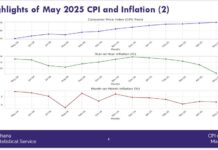Recent Posts
Most Popular
May inflation eases further to 18.4%
By Juliet ETEFE ([email protected])
Headline inflation eased further to 18.4 percent in May 2025 from 21.2 percent in April, marking the fifth consecutive month...
Fin Minister calls for increased indigenous ownership in mining sector
…inaugurates new MIIF board
The Minister of Finance, Dr. Cassiel Ato Baah Forson, has called on the Minerals Income Investment Fund (MIIF) to collaborate closely...
India Gold Metaverse courts prospects in local gold market
By Wisdom JONNY-NUEKPE
Global gold trader, India Gold Metaverse (IGM), is courting investment opportunities in the country’s gold value chain, in a bid to explore...
GWL to prosecute illegal water connection offenders
The Management of Ghana Water Ltd. (GWL), Accra West Region, has taken a decisive action to curb illegal water connections that continue to affect...
Father’s Day Extravaganza at ARC : Auto show, games, and gifts galore!
Achimota Retail Centre is revving up for a delightful Father’s Day extravaganza that could make most mothers jealous, as the mall unveils a stunning...










